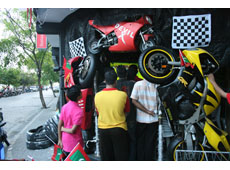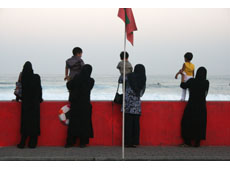‘Sew mouths that object, blind eyes that might see’ are the powerful words that confront you when you stand in front of the ‘Three dead monkeys’ piece at the Sugar Coated Bright Colours art exhibition.
The photo is intriguing and disturbing at the same time. The faces are painted white giving them a theatrical feel, a girl with her head thrown back and blood pouring from her eyes, the man in the middle with a devilish grin, a finger to his lips, as if saying ‘don’t talk about this’. A second girl with her mouth sewn shut.
It’s not only art on display – it’s the crucial issue of human rights viewed through the eyes of nine aspiring artists.
The exhibition was planned by local NGO Transparency Maldives to celebrate World Human Rights Day, with funding from Ausaid, UNDP and the EU.
“We planned this as part of our project: ‘I choose to know my rights’,” says Mohamed Thoriq Hamid, project coordinator of Transparency Maldives, an NGO working to improve governance and eliminate corruption from people’s daily lives.

Human Rights through Art
The exhibition follows two weeks of multi-media workshops. In line with the unusual theme, the venue for the launch was also unorthodox: Masveringe (Fisherman’s) park.
“We started the workshop with a presentation on Human Rights,” says Thoriq, who believes artists should be at the vanguard of the topic.
Speaking at the launching, chief guest Ahmed Wajeeh said “artists should reflect on issues, and we should open opportunities for creative ideas in society and respect them – even elders like us – as this will in make our society better.”
He reflected upon the importance of civil society and said Maldivians should be thankful to those who take initiative to improve society without taking sides.
The exhibit ‘Give me a chance’ seems to be crying out for that opportunity. Photos of basketball players accompany the plea. The text by Saadha Ahmed highlights an issue that a lot of youth face now – lamenting the fact that most do not have the opportunity to follow careers that interest them.

“I want the visitor to interpret what this means,” says Shafaath Ibrahim, 18. Displayed in a dark room, the image of a swing is projected on the screen. It seems to change in rhythm, but one can never be sure as a distorted mirror image obscures the swing from time to time.
It could be a depiction of your mood swings, the pace of your life, or how obstacles at times obscure your view of your goals.
“I learned a lot about human rights from that one session,” Shafaath says. As a student of CHSE (Centre for Higher Secondary Education) she feels there needs to be more awareness placed on human rights in secondary schools. She admits that human rights are not yet fully implemented fully in the Maldives, and says it is still a new concept.
Her fellow student Laesha Mohamed, 18, created a sculpture. Made using a mix of wire, clay, paper, nylon and rubber bands, she replicates to perfection the contours of human face with wire.
The face is suspended, while below two hands jut out manipulating items below.
“This piece blurs the line between sculpture and installation,” says Umair Badeeu, facilitator of the workshop along with Mohamed Khayyam Adam (Hassa).
“We asked artists to derive works from information they got the first day.”
Umair is a firm believer in giving creative freedom to artists, and letting them choose their own projects.
The end result he says is impressive for such a short working time: “Here there are space limitations, material limitations; yet each artist has overcome those hurdles to achieve what they wanted,” he says.
Creative freedom is something Moosa Mamdooh Ahmed, 24, holds dear.
“Freedom to create what you want is also a human right,” he says.

His life-size drawing of a dervish is arresting. The figure is still, with his eyes closed, and at his feet lies a giant snake, coiled and eating its own tail.
“The piece has to do with free will,” he explains. “Animals are stuck in a cycle. Only human beings have the choice to getting out of it: a human can choose to evolve, to learn new things, but the moment he decides he knows, he seals off his mind from learning.”
He questions what he describes as a current lack of spirituality, and says his drawing is about a person’s endeavor to seek answers.
Twenty-four year old Ahmed Afazil questions the futility of war with a series of drawings using watercolor, charcoal and stencil. Kane and Abel, Polpot and Hitler jostle for space with drawings depicting reality and utopia. The wording of utopia is hazy: “I don’t know what the ideal utopia is, but humans have not achieved it yet. There are always wars, people die, and a time of relative peace and again a war for some reason.”
Thoriq sums up the relationship between art and human rights: “Freedom of expression is crucial to artists. They should stay at the forefront of the battle for human rights.”
Sugarcoated Bright Colours can be viewed at H.Merryside,1st Floor (former Cyprea Building), weekdays from 8pm to 10pm, and weekends from 4pm to 6pm and 8pm to 10pm


